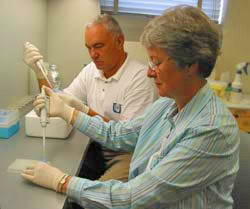A Better Melon: Visiting Fulbright Scholar and AU Plant Geneticist Collaborate on Genetic Research
Odds are that, when you slice into a big juicy watermelon, you aren't thinking about the sweet fruit's genes.
You can leave that to AAES plant geneticist Fenny Dane. As one of only a handful of scientists in the United States researching watermelon genetics, Dane is working to identify and map out the watermelon's genes, with the goal of giving producers and consumers better melons in the future.
Specifically, she and her research associates are tagging the genes that control fruit size, taste and color as well as yield, growth rate and disease and drought resistance.
Included in their analyses are wild cultivars, which, while not suitable for the market, often contain the genetic survival traits lacking in their domestic counterparts.
An understanding of the watermelon's genetic information also will be used to unravel the ancient fruit's evolution and origins.

AU plant geneticist Fenny Dane, right, and
visiting Fulbright Scholar Gábor Gyulai of
Hungary analyze DNA from 600-year-old
watermelon seeds.
Dane's research tracing the evolution of the watermelon got a major boost over the summer with the arrival in Auburn of visiting Fulbright Scholar Gábor Gyulai, a faculty member in plant breeding and genetics at Szent István University in Godollo, Hungary.
Gyulai brought with him a DNA collection from 15th-century watermelon seeds discovered in the excavation of the Royal Palace in Budapest. Dane and Gyulai discovered the seeds trace dramatic changes in DNA over 600 years.
The summer-long working visit to Auburn was Gyulai's third Fulbright Scholar award. In 1995 and again in 2001, he conducted research on leaf rust genes in wheat at Purdue University through Fulbright Scholar grants.
In addition to joint publications and plans with Dane for future collaborative research in the area of archeogenetics, Gyulai's visit benefited the CoAg horticulture department in the exchange of new ideas in research and teaching. Alabama agriculture will also benefit via the availability of new genetic information that could lead to improved quality of watermelons and other crops.
